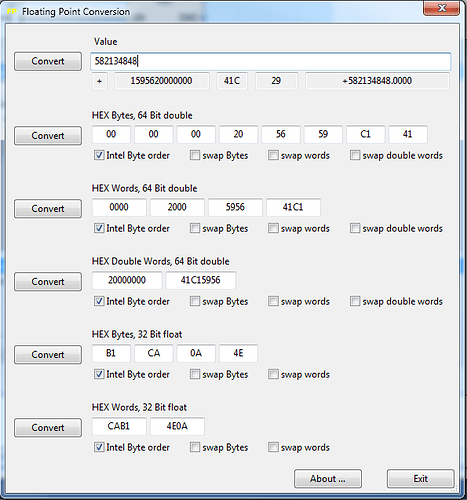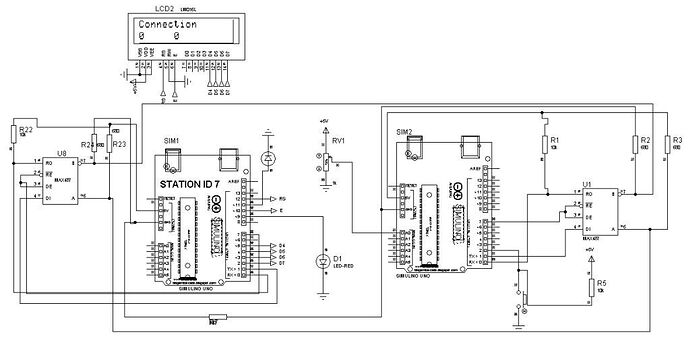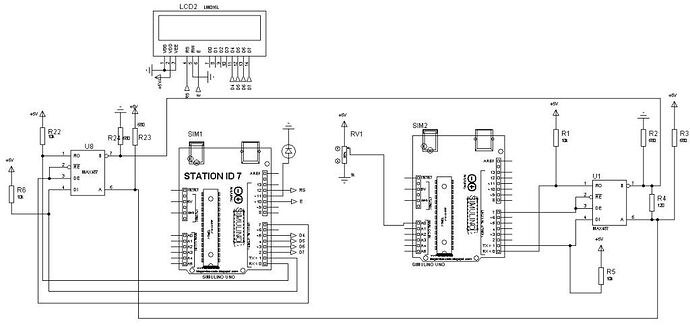Hi,
I have been working on MODMUS RTU communication between two Arduino Uno One arduino unso as Master and other is Slave. I am using [SimpleModbusMaste.h Rev2] and [SimpleModbusSlave V10] and RS487 as serial communication chip but I am getting OUTPUT only 0.
Here my code for master
//#include <Wire.h>
#include <SimpleModbusMaster.h>
#include <LiquidCrystal.h>
/*
The example will use packet1 to read a register from address 0 (the adc ch0 value)
from the arduino slave (id=1). It will then use this value to adjust the brightness
of an led on pin 9 using PWM.
It will then use packet2 to write a register (its own adc ch0 value) to address 1
on the arduino slave (id=1) adjusting the brightness of an led on pin 9 using PWM.
*/
//////////////////// Port information ///////////////////
#define baud 9600
#define timeout 2000
#define polling 400 // the scan rate
#define retry_count 20
// used to toggle the receive/transmit pin on the driver
#define TxEnablePin 7
#define SlaveID 1
#define LED 11
#define LED1 9
// The total amount of available memory on the master to store data
#define TOTAL_NO_OF_REGISTERS 2
LiquidCrystal lcd(12, 10, 5, 4, 3, 2);
// This is the easiest way to create new packets
// Add as many as you want. TOTAL_NO_OF_PACKETS
// is automatically updated.
enum
{
PACKET1,
PACKET2,
TOTAL_NO_OF_PACKETS // leave this last entry
};
// Create an array of Packets to be configured
Packet packets[TOTAL_NO_OF_PACKETS];
// Masters register array
unsigned int regs[TOTAL_NO_OF_REGISTERS];
void setup()
{
//Serial.begin(115200);
lcd.begin(16, 2);
// Initialize each packet
modbus_construct(&packets[PACKET1], 1, READ_HOLDING_REGISTERS, 0, 1, regs); //(packet,SlaveId,Function,holdingregAdress,data,locanstartadress)
modbus_construct(&packets[PACKET2], 1, READ_HOLDING_REGISTERS, 1, 1, regs);
// Initialize the Modbus Finite State Machine
modbus_configure(&Serial, baud, SERIAL_8N2, timeout, polling, retry_count, TxEnablePin, packets, TOTAL_NO_OF_PACKETS, regs);
pinMode(LED, OUTPUT);
pinMode(LED1, OUTPUT);
}
void loop()
{
lcd.setCursor(0, 0);
//lcd.print("MODBUS RTU");
modbus_update();
if (Serial.available()>0)
{
lcd.print("Connection");
//regs[1] = analogRead(A0); // update data to be written to arduino slave
analogWrite(LED, regs[0]/4);// constrain adc value from the arduino slave to 255
lcd.setCursor(0, 1);
lcd.print(regs[0]);
digitalWrite(LED1,regs[1]);
lcd.setCursor(6, 1);
lcd.print(regs[1]);
}}
and code for Slave
#include <SimpleModbusSlave.h>
/*
SimpleModbusSlaveV10 supports function 3, 6 & 16.
This example code will receive the adc ch0 value from the arduino master.
It will then use this value to adjust the brightness of the led on pin 9.
The value received from the master will be stored in address 1 in its own
address space namely holdingRegs[].
In addition to this the slaves own adc ch0 value will be stored in
address 0 in its own address space holdingRegs[] for the master to
be read. The master will use this value to alter the brightness of its
own led connected to pin 9.
The modbus_update() method updates the holdingRegs register array and checks
communication.
Note:
The Arduino serial ring buffer is 64 bytes or 32 registers.
Most of the time you will connect the arduino to a master via serial
using a MAX485 or similar.
In a function 3 request the master will attempt to read from your
slave and since 5 bytes is already used for ID, FUNCTION, NO OF BYTES
and two BYTES CRC the master can only request 58 bytes or 29 registers.
In a function 16 request the master will attempt to write to your
slave and since a 9 bytes is already used for ID, FUNCTION, ADDRESS,
NO OF REGISTERS, NO OF BYTES and two BYTES CRC the master can only write
54 bytes or 27 registers.
Using a USB to Serial converter the maximum bytes you can send is
limited to its internal buffer which differs between manufactures.
*/
#define baud 9600
#define TxEnablePin 7
#define SlaveID 1
#define button 2
#define analog A0
// Using the enum instruction allows for an easy method for adding and
// removing registers. Doing it this way saves you #defining the size
// of your slaves register array each time you want to add more registers
// and at a glimpse informs you of your slaves register layout.
//////////////// registers of your slave ///////////////////
enum
{
// just add or remove registers and your good to go...
// The first register starts at address 0
ADC_VAL,
DIG_VAL,
HOLDING_REGS_SIZE // leave this one
// total number of registers for function 3 and 16 share the same register array
// i.e. the same address space
};
unsigned int holdingRegs[HOLDING_REGS_SIZE]; // function 3 and 16 register array
////////////////////////////////////////////////////////////
void setup()
{
//Serial.begin(9600);
/*parameters(HardwareSerial* SerialPort,
long baudrate,
unsigned char byteFormat,
unsigned char ID,
unsigned char transmit enable pin,
unsigned int holding registers size,
unsigned int* holding register array)
*/
/* Valid modbus byte formats are:
SERIAL_8N2: 1 start bit, 8 data bits, 2 stop bits
SERIAL_8E1: 1 start bit, 8 data bits, 1 Even parity bit, 1 stop bit
SERIAL_8O1: 1 start bit, 8 data bits, 1 Odd parity bit, 1 stop bit
You can obviously use SERIAL_8N1 but this does not adhere to the
Modbus specifications. That said, I have tested the SERIAL_8N1 option
on various commercial masters and slaves that were suppose to adhere
to this specification and was always able to communicate... Go figure.
These byte formats are already defined in the Arduino global name space.
*/
modbus_configure(&Serial,baud, SERIAL_8N2,SlaveID, TxEnablePin ,HOLDING_REGS_SIZE, holdingRegs);
// modbus_update_comms(baud, byteFormat, id) is not needed but allows for easy update of the
// port variables and slave id dynamically in any function.
//modbus_update_comms(9600, SERIAL_8N2, 1);
pinMode(button, INPUT);
}
void loop()
{
// modbus_update() is the only method used in loop(). It returns the total error
// count since the slave started. You don't have to use it but it's useful
// for fault finding by the modbus master.
modbus_update();
holdingRegs[ADC_VAL] = analogRead(A0); // update data to be read by the master to adjust the PWM
holdingRegs[DIG_VAL] = digitalRead(button);
//analogWrite(LED, holdingRegs[1]/4); // constrain adc value from the arduino master to 255
/* Note:
The use of the enum instruction is not needed. You could set a maximum allowable
size for holdinRegs[] by defining HOLDING_REGS_SIZE using a constant and then access
holdingRegs[] by "Index" addressing.
I.e.
holdingRegs[0] = analogRead(A0);
analogWrite(LED, holdingRegs[1]/4);
*/
}
I have tried in these two way but I didn't get any output..


